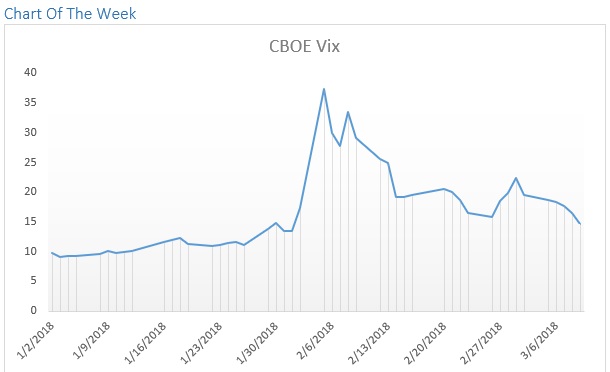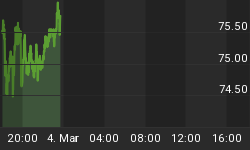Solid jobs report, but is volatility back for good? The U.S. jobs report on Friday provided a jolt of confidence to the financial markets. U.S. employment expanded by 313,000 jobs in February, well above the 200k estimate, while at the same time wage growth was tepid. That was deemed to be a goldilocks-style report – strong enough to keep the optimism going while not spreading fears of deeper monetary tightening. However, it is not clear how long this will last. Higher market volatility, signs of rising inflation, and fears of a brewing trade war could wreck the party at any moment. The Bank of International Settlements said in a report that volatility is coming back after a long period of stability.

(Click to enlarge)
- On Friday, the CBOE Volatility Index (VIX) dropped to its lowest level since February 1, as the U.S. jobs report struck the perfect tone – strong economic growth but not so strong as to provoke deeper rate tightening from the Fed.
- The reports that the Trump administration would offer some tariff exemptions also helped soothe trading fears.
- However, the risks of turmoil are widely seen as much greater this year compared to 2017.
Monday, March 12, 2018
Markets
U.S allies seek clarity on trade exemptions. European Union and Japanese officials spent the weekend trying to figure out the procedure for exemptions from President Trump’s steel and aluminum tariffs. President Trump tweeted on Saturday that the EU is treating the U.S. “very badly on trade,” and “if they drop their horrific barriers & tariffs on U.S. products going in, we will likewise drop ours. Big Deficit. If not, we Tax Cars etc. FAIR!” In response, EU officials have said they would not enter trade negotiations in exchange for tariff exemptions. Instead, the EU said that it would impose $3.5 billion in levies on American products unless it was granted an exemption. Meanwhile, Republicans in the U.S. Congress are contemplating legislation that would roll back the tariffs.
Central banks should continue tightening. The sudden uptick in market volatility should not deter central banks from proceeding with the withdrawal of monetary stimulus, according to the Bank of International Settlements (BIS). “Treading the path (of policy normalization) will call for a great deal of skill, judgment and, yes, also a measure of good fortune,” said Claudio Borio, the head of the BIS’ monetary and economic department. “But policymakers need not fear volatility as such. Along the normalization path, some volatility can be their friend.” BIS noted that the prospect of a trade war certainly complicates monetary tightening, but that central banks should not be deterred. Related: The $7 Trillion Club That Even Goldman Sachs Couldn’t Join
China at risk of banking crisis. The Bank of International Settlements singled out China in its quarterly review as one country most at risk of a banking crisis. BIS noted that China’s debt, measured by a credit-to-GDP gap, is at a level that could lead to systemic trouble. In other words, credit is expanding too fast relative to the strength of the economy. The report also said that Canada and Hong Kong also faced some risk of a banking crisis, in part because of high property prices.
Commodities
Gold falls back on strong U.S. jobs report, risk-taking. The U.S. jobs report replenished some optimism in equities because of the perfect combination of job growth and muted wage increases, which tempered expectations of a rate hike from the Fed. Ultimately, that led to equity gains and a steady dollar, forcing gold to fall back from last week’s levels. Still, CFTC data shows that investors boosted their net long positions in gold last week.
Miners struggle to contain costs. With a commodity cycle on the upswing, top miners are scrambling to keep a lid on costs. Labor, fuel and chemicals are getting more expensive. The relative weakness of the U.S. dollar compared to other currencies where mining companies work is also inflating costs. For example, South Africa’s rand is up 22 percent over the past four months. “Clearly, inflation’s becoming a bigger issue,” Anglo American (LON: AAL) CEO Mark Cutifani told the Wall Street Journal. “So we’ve got to run twice as hard.” According to S&P, copper production costs increased in 2017 for the first time in 5 years.
Chile greenlights higher lithium investment. Chile allowed Albemarle Corp. (NYSE: ALB) to ratchet up lithium production in response to higher prices and new technology. Chilean officials said that Albemarle could produce as much as 140,000 tonnes per year, up from 60,000 to 80,000 tonnes. Albemarle said that advances in technology will allow it to produce more lithium without the need to extract more brine. Chile is already one of the largest lithium producers in the world and output is expected to grow significantly.
Energy
Oil sentiment dips. Oil prices were flat in early trading on Monday, ending a brief jolt of optimism after a surprise decrease in the rig count on Friday. Expectations of surging U.S. shale production are weighing on market sentiment, and last week saw a surge in short-selling that suggests at least some investors are betting on a deeper decline in oil prices. The increase in shorts was the largest so far this year. “If you’re taking a speculative short position, you’re looking at what U.S. production is going to do,” Ashley Petersen, an analyst at Stratas Advisors, told Bloomberg. “There’s starting to be a little bit of a turn in sentiment.”
White House to host another biofuels meeting. The contentious battle between the biofuels and oil industries continues with another meeting at the White House scheduled for Monday. The divide over the Renewable Fuels Standard (RFS), which requires oil refiners to blend corn ethanol into their fuel mix, has split two industries that tend to support Republicans. With the support of major U.S. refiners, the Trump administration has indicated some willingness to tweak the law, to the consternation of Big Corn. The January bankruptcy of Philadelphia Energy Solutions, which controlled the largest refining complex on the East Coast, was attributed to the pricey requirements of the RFS. Related: Why Is U.S. Wage Growth Slowing?
Eni wins two blocks in offshore UAE. Eni (NYSE: E) was awarded the rights to drill in two blocks off the coast of Abu Dhabi, while also selling Abu Dhabi National Oil Co. a 10 percent stake in the giant Zohr gas field in Egypt for $575 million. The government of Abu Dhabi also purchased a 10 percent stake in the Shorouk concession in Egypt for $934 million. Meanwhile, Eni acquired a 5 percent stake in the Lower Zakum deposit for $300 million. Taken together, it is a significant reshuffling for Eni. “Eni is very strong in North Africa, but has traditionally been under-exposed to the Middle East,” an analyst at Wood Mackenzie told Bloomberg.
Cryptocurrencies
Thomson Reuters to track Bitcoin movements. Thomson Reuters Corp. announced plans to launch a new version of its MarketPsych Indices to track rumors and data on Bitcoin. The platform will gather intelligence and market developments from over 400 websites to “capture market-moving sentiment and themes.” It will provide a way for investors to interpret the latest swings in social media, market sentiment and breaking news and how the value of Bitcoin might be affected. “News and social media are driving the investment and risk management process more than ever with the continuing rise of passive and quant-driven trading,” said Austin Burkett, Global Head of Quant and Feeds, Thomson Reuters.
Free cryptocurrencies “airdropped” in new marketing strategy. Cryptocurrency startups are testing a new strategy to attract attention and investors: offering free cryptocurrencies to those already holding other coins. For instance, holders of the cryptocurrency neo were granted free coins of ontology, another cryptocurrency. By “airdropping” new coins, the crypto-startup can market the new currency in lieu of spending huge sums on traditional marketing. "Slipping money into someone's pocket is a powerful way to get their attention," Spencer Bogart, partner at San Francisco-based Blockchain Capital, told CNBC.
Bitcoin, other cryptocurrencies fell sharply last week. Bitcoin briefly traded below $8,500 on Friday, losing more than 15 percent on the week. Other cryptocurrencies posted steep losses as well – neo lost about a third of its value in a week. Some attribute the losses to rising regulatory scrutiny. On March 8, the Japanese Financial Services Agency issued “Punishment Notices” for 7 cryptocurrency exchanges. A day earlier, the U.S. SEC said that all cryptocurrency exchanges trading securities are required to register with the commission. On March 6, a federal judge ruled that cryptocurrencies are commodities, and are thus subject to regulation. With that said, many coins regained some lost ground on Monday.
By Charles Benavidez for Safehaven.com
More Top Reads From Safehaven.com:
















